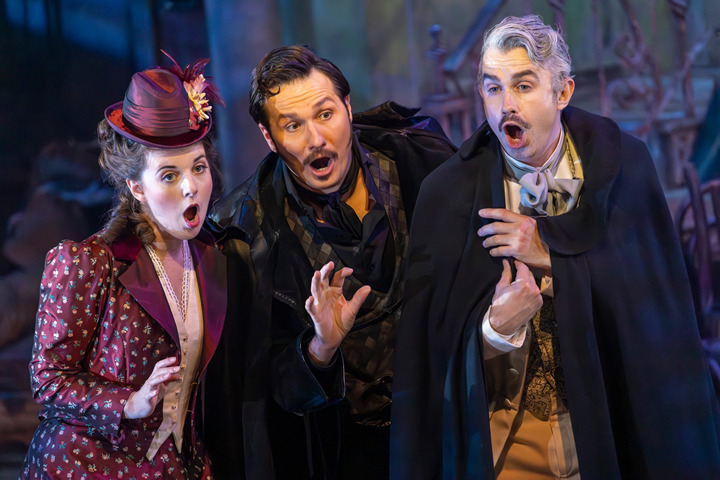| Opera Reviews | 29 April 2024 |
A highly entertaining revival of Thomas Allen's witty productionby Catriona Graham |
|
Rossini: The Barber of Seville |
|
 |
|
|
Some operas are just fun. Sure, directorial spin can be imposed to give some deep meaning but, really, it should be enjoyed for itself, its music, the wit of the libretto and the foibles and failings of its characters. One such is Rossini’s The Barber of Seville, particularly in Sir Thomas Allen’s production, to Amanda Holden’s witty translation, revived by Scottish Opera. Set in a slightly decrepit Seville, designed by Simon Higlett and lit by Mark Jonathan, the action starts with the overture, as the city wakes up, newspapers and baguettes are delivered, painters arrive and musicians assemble to serenade Rosina, under the direction of the local café proprietor and commissioned by Almaviva. As Count Almaviva, Anthony Gregory is more silver fox (or prematurely grey) than young nobleman, but his voice is light and lyrical. Soon, he bumps into Figaro, the barber, with whom he has some previous connection. It may be worth pointing out that, although all the characters in this opera have a good conceit of themselves, Figaro’s self-worth is the highest. Samuel Dale Johnson is charming and energetic, singing a variety of tongue-twisters with aplomb, switching between machismo and camp, his Figaro conscious at all times that he has style. In no time, Figaro is helping (for a fee) Almaviva in his pursuit of Rosina. Simone McIntosh is a delightful Rosina, and her first aria ("Una voce poco fa") sets out her musical stall. For all she is in love with ‘Lindoro’, she is flirting with Figaro as they plot to inveigle Lindoro into the house as a billeted soldier. Almaviva’s ‘drunken’ arrival disconcerts Rosina’s guardian, Don Bartolo, who intends to marry his ward. David Stout is appropriately portly, and sings his own tongue-twisters very well indeed. He does a good line in sceptical looks, both at the drunken antics of the soldier, and at the slanderous suggestions of Don Basilio, Rosina’s music teacher, a snake-like John Molloy. Nothing goes to plan, of course, and there is a second attempt when Almaviva comes back disguised as a particularly unctuous priest, on the pretext that he will give Rosina her music lesson instead of a suddenly indisposed Don Basilio. By now, an undercurrent of audience chuckling is audible. So much is going on, from changes in weather (brollies and lightning) to eaves-dropping nuns next door, placing the storyline of the action as just one amongst the many in Seville which could thus be narrated. By the time that night has fallen, Don Bartolo has been outsmarted and Rosina has married Almaviva, and he accepts defeat with a reasonable grace. This production laughs at the characters – even Rosina, when she has a fit of petulance – but does not mock them cruelly. Even the minor roles of Berta (Inna Husieva), Almaviva’s servant Fiorello / an Officer (Ross Cumming) and Don Bartolo’s aged retainer Ambrogio (Paul Anwyl) are portrayed as generously as the major ones. Conductor Stuart Stratford ensures the pit and chorus keep pace with the events on stage – crashing sounds from the orchestra timed perfectly with lighting effects. Ross Morris plays guitar for the serenade and Anthony Gregory’s mime to Fiona McSherry’s piano is hilarious. At the end, the audience goes out into the damp November night having been properly entertained. |
|
Photo © James Glossop |
|







